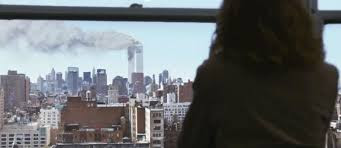The Schell Game
or
An Irrational Fear of the Irrational
Not sure what the problem with young Oskar Schell (Thomas Horn) is: it could be borderline autism, or as is brought up, Asperger Syndrome ("the tests were inconclusive," he deadpans). It could be "mean world syndrome" or "fusion paranoia," or something as simple as shock or grief, maybe even survivor's guilt. But, coached by his father (Tom Hanks) who died in the Twin Towers on 9/11, he is on a mission to find answers by the same empirical methods Dad used to create scavengers' hunts throughout the city of New York.
To the young Schell, the events that took his father, literally before his eyes, yet in an abstract undefinable way (he literally vanishes, but there is no body to bury), it is all horrifyingly absurd, and the only way to wrap his mind around it is a quest, in the same way that his father distracted him from his fears, which are plentiful (closed spaces, crowded places, tubes and tunnels, things that fly, things that are loud, bridges that could collapse) all things that keep his logical, compartmentalized fact-file of a mind focused on the task at hand, to the rhythm of the tambourine that he shakes to keep his own mind from being rattled by anything else.
One day, after visiting the shrine he's constructed for his father, he confronts for the first time his father's room and closet kept undisturbed since the Al Qaida attacks, smelling his clothes, trying to recall the sense-memory of him, when by happenstance, he finds an envelope (marked "Black") containing a single key. Thinking it to be the ultimate of one of his father's challenges, he embarks to find the one lock in all of New York mated to that key.It's a tortured, torturing metaphor. What he's really looking for is something...anything...that might give him solace for his loss, an answer to why his beloved, obliquely protecting father might vanish so completely, without even the cold reality of a corpse to ground him to reality. In the process, he neglects his mother (Sandra Bullock), his schooling, his life...for the ultimate answer of purpose, and thereby complete the education cut short by the death of his father. It's a risky premise, one that, ultimately, can have no real resolution, but only absolve him of any complicity in the events of his father's death.
What Oskar is actually looking for is his own penance.
Movies come in cycles, not only because of the economic consequences of box-office (nothing in Hollywood succeeds like excess), but also with the nation's zeitgeist. Is it any coincidence that Extremely Loud and Incredibly Close is a modern day version of New York film-maker Martin Scorsese's Hugo...about another boy's father-quest involving a key and finding something else more than himself? Hard to say...anymore than that Hugo and The Artist are both explorations and celebrations of the era of visual story-telling displayed by the dawn of moving pictures. But, EL&IC has the disadvantage of being a little too close to the theme without the benefit of artistic distance, while being a little too obvious about what it's trying to say...which, as it turns out, isn't much...other than "what are you worried about, kid, when you might be hit by a bus tomorrow." Or dharma works, when runaway karma runs over your dogma. Thanks, but I'd rather have Méliès be a cure for my malaise.
But, what a cast...Hanks, Bullock (basically in the background for most of the movie but allowed to shine at the film's resolution), John Goodman, Viola Davis, Jeffrey Wright and a steady stream of fine character actors as Oskar's many encounters and tough-stones on his journey. But, the finest of the bunch is Max von Sydow as the Campbellian "helper by the side of the road" that he plays mutely without a word of dialog. Again, the part is a little obvious and a little tortured, but von Sydow once again provides an actor's master class in taking a role of lightness and making it breathe with life and truth.







No comments:
Post a Comment